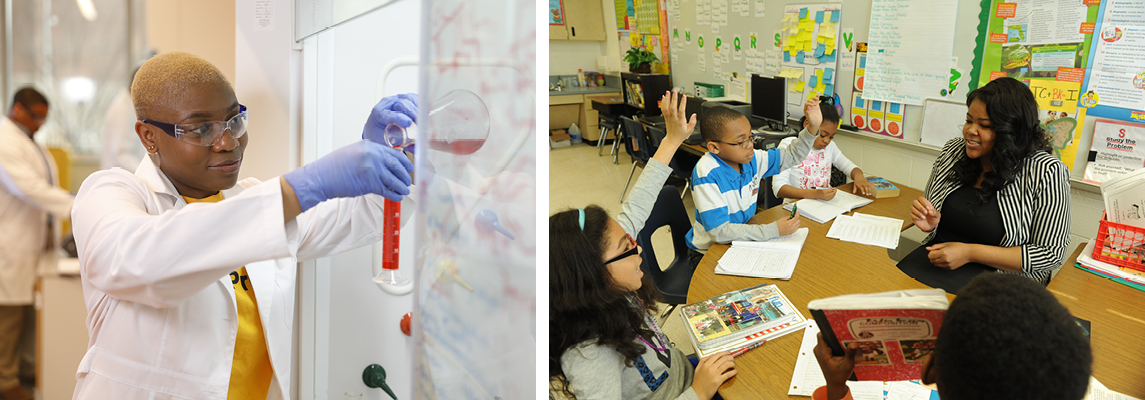Annual Report 2019-2020
New Degree Programs

New degree programs in chemistry (pictured left) and culturally responsive teacher leadership (pictured right) are preparing a new generation of students.
Preparing Students for Changing Workforce Needs
By 2028, industries ranging from tech to education to manufacturing will put a premium on hiring folks who can unravel complex problems with creativity, fresh perspectives and critical thinking. Continuing a legacy of not just responding to current needs but projecting future opportunities, Bowie State University’s new degree programs in chemistry and culturally responsive teaching are preparing students to diversify their career options and excel in an always-changing workforce.
Adding to the Department of Natural Sciences’ exemplary majors in biology, science education and bioinformatics, the new Bachelor of Science degree in chemistry will funnel more qualified Black professionals into growing fields like forensics and medical sciences. Chemistry-related job openings are expected to ramp up by 5%—faster than the average for all occupations—and students will be prepared to jump into cutting-edge careers like hydrology, chemical engineering and pharmacology.
“Chemistry is highly competitive and very few African-Americans coming from our school systems are able to endure that competition. This major opens a wider door for many more minorities to get into the chemistry arena and join the workforce,” said department chair Dr. George Ude, who also encourages chemistry majors to broaden their career interests into zoology, toxicology, food science and other associated STEM fields.
The program was introduced in spring 2020 with a curriculum based on faculty’s combined expertise in physical, medicinal, organic and inorganic chemistries. Students will enhance their classroom learning with experiential research at the Center for Natural Sciences, Mathematics and Nursing, which houses state-of-the-art labs and a greenhouse, and faculty mentorship at the Ronald E. McNair Scholars Program and Summer Undergraduate Research Institute (SURI).
“The major responds to the needs to make chemistry—a traditionally hard subject—more accessible by removing some of the psychological barriers that can be present,” said program coordinator Dr. Jacqueline Smith. “This will allow Black students to confidently pursue graduate school, or industry or government jobs because they will have had hands-on training in the field.”
Enhancing the Teacher Workforce
In addition to STEM, innovation is an important part of the university’s strategic plan to transform all academic initiatives, and keep both students and educators ahead of learning trends. In the Department of Educational Leadership, a first-of-its-kind master’s program will help experienced teachers deliver culturally relevant lessons to improve students’ success. Diversity isn’t limited to race and ethnicity, says Dr. Wil Parker, co-creator of the program and chair of the Department of Educational Leadership. It encompasses culture, linguistics and other critical factors across inclusive classrooms.
“What's unique about Bowie State is that we have an opportunity to serve the tri-state area of Maryland, DC and Virginia, which has urban and rural areas. That means a whole gamut of why students are different,” he explained. “It's important to understand that teachers, students and leaders’ lived experiences cultivate how they learn and culturally relevant individuals help to make that happen.”
The Master of Education in culturally responsive teacher leadership degree is the interdisciplinary brainchild of faculty in the departments of Educational Leadership and Teaching, Learning & Professional Development. In addition to meeting students’ needs, the 12-month accelerated program, scheduled to begin accepting applications in spring 2021, will also help teachers find strategic ways to grow and advance their careers.
“Having highly qualified teachers in the classroom who are also equipped with culturally responsive pedagogy and evidence-based leadership skills will better prepare students to become critical thinkers, collaborators, communicators and civic-minded citizens,” added Dr. Davenia Lea, co-creator of the program and associate professor in the Department of Teaching, Learning & Professional Development. “Culturally responsive teachers will also know how to advocate for needed resources, exercise their voice, inform decisions and impact curriculum.”
Next article: Research Partnerships
Browse Sections
President’s Letter Academics & Research Excellence Innovation in Teaching Celebrating Student Success
Donor Honor RollFinancials (PDF) Administration
